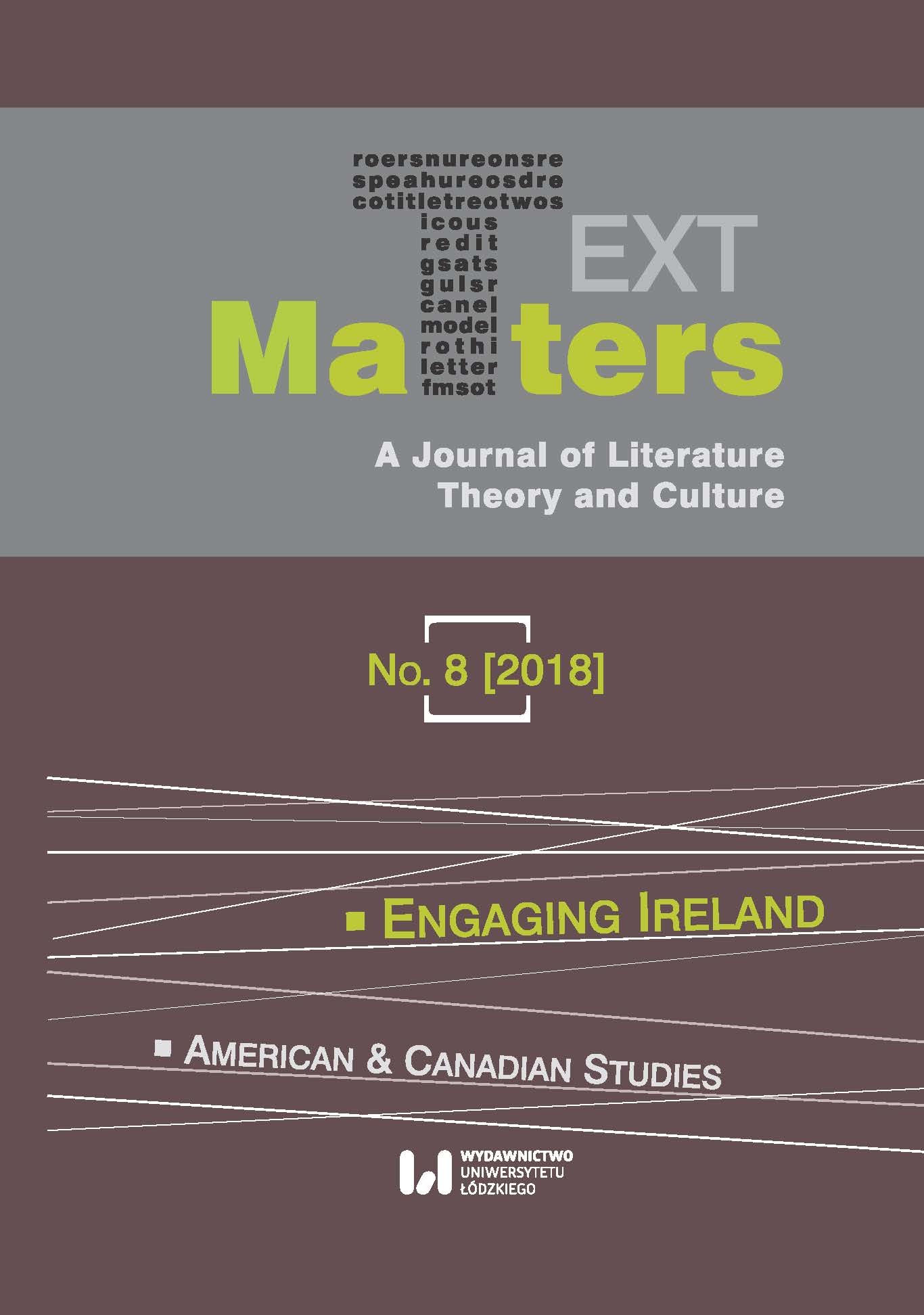“No Country for Old Men”? The Question of George Moore’s Place in the Early Twentieth-Century Literature of Ireland
DOI:
https://doi.org/10.1515/texmat-2018-0002Keywords:
Gaelic Revival, George Moore, Ivan Turgenev, The Untilled FieldAbstract
The paper scrutinizes the literary output of George Moore with reference to the expectations of the new generation of Irish writers emerging at the beginning of the twentieth century. Although George Moore is considered to belong to the Anglo-Irish ascendancy writers, he began his writing career from dissociating himself from the literary achievements of his own social class. His infatuation with the ideals of the Gaelic League not only brought him back to Dublin, but also encouraged him to write short stories analogous to famous Ivan Turgenev’s The Sportsman’s Sketches. The idea of using a Russian writer as a role model went along with the Gaelic League advocating the reading of non-English European literature in search for inspiration. However the poet’s involvement in the public cause did not last long. His critical view on Ireland together with his uncompromising approach towards literature resulted in a final disillusionment with the movement. The paper focuses on this particular period of Moore’s life in order to show how this seemingly unfruitful cooperation became essential for the development of Irish literature in the twentieth century. The Untilled Field, though not translated into Irish, still marks the beginning of a new genre into Irish literature—a short story. More importantly, the collection served as a source of inspiration for Joyce’s Dubliners. These and other aspects of Moore’s literary life are supposed to draw attention to the complexity of the writer’s literary output and his underplayed role in the construction of the literary Irish identity.
Downloads
References
Brown, Terence. Introduction. The Untilled Field. By George Moore. Dublin: Gill, 1990. xi–xvi. Print.
Google Scholar
Cantwell, Eamonn R. “Crossing Borders: Moore and Yeats in the Theatre.” George Moore: Across Borders. Ed. Christine Huguet and Fabienne Dabrigeon-Garcier. Amsterdam: Rodopi, 2013. 99–112. Print.
Google Scholar
Cave, Richard. A Study of the Novels of George Moore. Buckinghamshire: Colin Smythe, 1978. Print.
Google Scholar
Cronin, John. “George Moore: The Untilled Field.” The Irish Short Story. Ed. Patrick Rafroidi and Terence Brown. Buckinghamshire: Colin Smythe, 1979. 113–26. Print.
Google Scholar
Deane, Seamus. Celtic Revivals. London: Faber, 1985. Print.
Google Scholar
Deane, Seamus. Strange Country. Oxford: Oxford UP, 1997. Print.
Google Scholar
Dunleavy, Janet E., and Gareth W. Dunleavy. Douglas Hyde. A Maker of Modern Ireland. Berkeley: U of California P, 1991. Print.
Google Scholar
Foster, R. F. The Irish Story. Telling Tales and Making Them Up in Ireland. Oxford: Oxford UP, 2002. Print.
Google Scholar
Foster, R. F. Vivid Faces. The Revolutionary Generation in Ireland 1890–1923. London: Penguin, 2015. Print.
Google Scholar
Frazier, Adrian. George Moore. 1852–1933. New Haven: Yale UP, 2000. Print.
Google Scholar
Genet, Jacqueline. The Big House in Ireland. Reality and Representation. Dingle: Brandon, 1991. Print.
Google Scholar
Gerber, Helmut E., ed. George Moore in Transition. Detroit: Wayne State UP, 1968. Print.
Google Scholar
Gregory, Augusta. Seventy Years 1852–1922. Being the Autobiography of Lady Gregory. Gerrards Cross: Colin Smythe, 1974. Print.
Google Scholar
Joyce, James. Dubliners. Oxford: Oxford World Classics, 2008. Print.
Google Scholar
Kenner, Hugh. A Colder Eye. Modern Irish Writers. Baltimore: John Hopkins UP, 1989. Print.
Google Scholar
Kiberd, Declan. “George Moore’s Gaelic Lawn Party.” The Way Back. George Moore’s “The Untilled Field” and “The Lake.” Ed. Robert Welch. Dublin: Wolfhound, 1982. 13–27. Print.
Google Scholar
Kiberd, Declan. Inventing Ireland. The Literature of the Modern Nation. London: Vintage, 1995. Print.
Google Scholar
Longley, Edna. The Living Stream. Literature and Revisionism in Ireland. Dublin: Bloodaxe, 1994. Print.
Google Scholar
Moore, George. Drama in Muslin. London: Colin Smythe, 1981. Print.
Google Scholar
Moore, George. Esther Waters. Oxford: Oxford World Classics, 2008. Print.
Google Scholar
Moore, George. Hail and Farewell. Gerrards Cross: Colin Smythe, 1976. Print.
Google Scholar
Moore, George. The Untilled Field. Dublin: Gill, 1990. Print.
Google Scholar
Norris, David. “Imaginative Response versus Authority Structures. A Theme of the Anglo-Irish Short Story.” The Irish Short Story. Ed. Patrick Rafroidi and Terence Brown. Buckinghamshire: Colin Smythe, 1979. 39–62. Print.
Google Scholar
Pierse, Mary S. “George Moore and his Dublin Contemporaries: Reputations and Reality.” George Moore: Dublin, Paris, Hollywood. Ed. Adrian Frazier and Conor Montague. Dublin: Irish Academic P, 2012. 81–93. Print.
Google Scholar
Smith, Stan. Irish Poetry and the Construction of Modern Identity. Dublin: Irish Academic P, 2005. Print.
Google Scholar
Welch, Robert. Preface. The Way Back. George Moore’s “The Untilled Field” and “The Lake.” Ed. Robert Welch. Dublin: Wolfhound, 1982. 7–12. Print.
Google Scholar
Welch, Robert. Changing States. Transformations in Modern Irish Writing. London: Routledge, 1993. Print.
Google Scholar
Yeats, William Butler. Autobiographies. London: Macmillan, 1961. Print.
Google Scholar
Downloads
Published
How to Cite
Issue
Section
License
Copyright (c) 2018 A Journal of Literature, Theory and Culture

This work is licensed under a Creative Commons Attribution-NonCommercial-NoDerivatives 4.0 International License.













